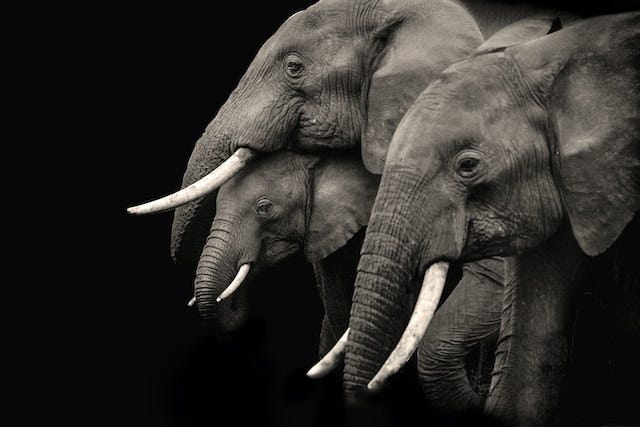
I stood on the crest of a hill watching the sunset. It was an aesthetic wonder, the type of view you'd hike all day to see. Between me and the valley was a herd of 20 elephants standing in a neat row, backlit by the sunset. Their trunks and tusks hung like the black and white keys along a grand piano and cast long shadows onto the rock wall behind us. It seems odd now to have seen those elephants at sunset, but it felt normal at the time. That scene lasted for a moment, then the herd broke, starting down the mountain road. We went running after the elephants but had no chance of catching them. At the bottom of the hill, I stopped and sulked. It was dark. I'd missed the sunset.
This dream of mine offers a metaphor for our existence in the Digital Age: we are always chasing elephants.
We think that we have command over our attention, that we select what we consume and choose what to focus on. But we don't. Our digital devices drag us around by the leash of an algorithm and prod us with targeted ads. Why didn't I stay and watch the sunset? Why did I forget what I was focused on and what I was there to do? Why did I chase the elephants?
In my dream, I was a victim of the spectacle. A distraction drew my attention away from something I value toward something exciting and alluring but, ultimately, empty. Recently, I've done the same in my waking life — putting off writing for a YouTube binge or playing a worn-out video game instead of finishing a good book. I've been more distracted than usual, more susceptible to the spectacle. So, I'm writing this to remind myself of our situation. We are not shepherds but the spectacle's sheep.
In The Society of the Spectacle, Guy Debord argues that our existence has become more about consuming images than experiencing reality. "The spectacle" is what governs this way of living:
In societies where modern conditions of production prevail, life is presented as an immense accumulation of spectacles. Everything that was directly lived has receded into a representation.1
The modern conditions of production are characterized by digital media, social platforms, and search engines. And in the Digital Age, attention is the most valuable commodity. There's a marketplace for our eyeballs, and what we consume alienates us from experience. We chase herds of elephants down hills, down infinite Internet rabbit-holes, through an endless series of short-form videos — all the way into pits of apathy and self-depreciation for which the only medication is more content.
The digital world is more like a dream than reality. As Stephen West explains on Philosophize This!, "the spectacle transforms our reality into a revolving door of commodifiable images."2 Is that not also a perfect description of your Instagram feed? In both dreams and digital space, the spectacle reigns. The only difference is that in a dream, the images you see are from your subconscious. On social media, the images come from random strangers with iPhones.
The tragedy of the spectacle is that we mistake it for authentic experience. We treat celebrity news, football games, trending topics, and political scandals as if they're events in our lives, rather than fleeting images on a screen. We mistake what we see for reality. What if I mistook my dream for reality? Well, there's a word for that: psychopathy.
When a child wakes up from a nightmare, a parent consoles him by saying that none of it was real, that the dream was just a stream of images in his head. In the same way, we must remind ourselves of the spectacle and the way it alienates us from reality. The next time you see a herd of elephants, enjoy their presence — revel in their wonder — but don't let them lead you away from what you value. When they run down the mountain, stand still and watch the rest of the sunset.
Springboard:
What precautions do you take to maintain control of your attention? How do you avoid distraction?
Thank you to for helping this piece find its way. If you enjoyed this, here's a related post with more on the digital deluge:
The Society of the Spectacle – Guy Debord
Philosophize This!, Ep. #171 – Stephen West






I've tried to combat the tyranny of short-form video, but it's still seeped into my life. I've never downloaded TikTok. I've been off Instagram, Facebook, and Snapchat for over a year, and I'm barely on Twitter. But I watch YouTube every day. I've always found it to be a source of quality content — both entertaining and educational.
Now that YouTube has its Shorts, avoiding short-form video content has become purely a matter of will. And, so far, I've failed. Next time I'm tempted to click, I'll try to remind myself not to chase the elephants.
This is something I found myself having to deal with lately. I cannot concentrate on reading. I usually watch movies when I'm tense, so that I can relax, but now even that is difficult.
Everytime I try to read or write, I find myself grabbing my phone instead and scrolling through Instagram feed, or trying to see if I have new messages on WhatsApp, or to see if my posts has gotten more views and comments. I feel distracted and I do not like it. Yet, I don't know how to deal with it.
I'm considering getting rid of my phone for a while (I am very certain that would help me), but that's impossible because I have responsibilities online, and work to do.
This has been my state of mind. Thank you for sharing this. Even if I don't have a solution yet (and I'm still introspecting), at least I'm now aware I've been chasing elephants.